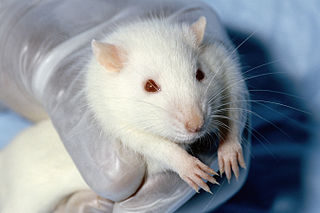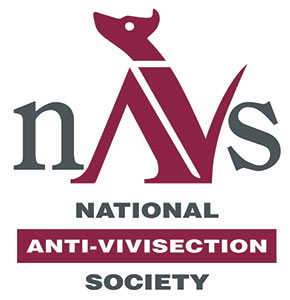
Animal welfare is the well-being of non-human animals. Formal standards of animal welfare vary between contexts, but are debated mostly by animal welfare groups, legislators, and academics. Animal welfare science uses measures such as longevity, disease, immunosuppression, behavior, physiology, and reproduction, although there is debate about which of these best indicate animal welfare.

Animal testing, also known as animal experimentation, animal research, and in vivo testing, is the use of non-human animals in experiments that seek to control the variables that affect the behavior or biological system under study. This approach can be contrasted with field studies in which animals are observed in their natural environments or habitats. Experimental research with animals is usually conducted in universities, medical schools, pharmaceutical companies, defense establishments, and commercial facilities that provide animal-testing services to the industry. The focus of animal testing varies on a continuum from pure research, focusing on developing fundamental knowledge of an organism, to applied research, which may focus on answering some questions of great practical importance, such as finding a cure for a disease. Examples of applied research include testing disease treatments, breeding, defense research, and toxicology, including cosmetics testing. In education, animal testing is sometimes a component of biology or psychology courses. The practice is regulated to varying degrees in different countries.

Vivisection is surgery conducted for experimental purposes on a living organism, typically animals with a central nervous system, to view living internal structure. The word is, more broadly, used as a pejorative catch-all term for experimentation on live animals by organizations opposed to animal experimentation, but the term is rarely used by practising scientists. Human vivisection, such as live organ harvesting, has been perpetrated as a form of torture.
Cruelty Free International is an animal protection and advocacy group that campaigns for the abolition of all animal experiments. They organise certification of cruelty-free products which are marked with the symbol of a leaping bunny.

A feral cat or a stray cat is an unowned domestic cat that lives outdoors and avoids human contact: it does not allow itself to be handled or touched, and usually remains hidden from humans. Feral cats may breed over dozens of generations and become an aggressive local apex predator in urban, savannah and bushland environments. Some feral cats may become more comfortable with people who regularly feed them, but even with long-term attempts at socialization, they usually remain aloof and are most active after dusk. Of the 700 million cats in the world, an estimated 480 million are feral.

Humane education is broadly defined as education that nurtures compassion and respect for living beings In addition to focusing on the humane treatment of non-human animals, humane education also increasingly contains content related to the environment, the compassionate treatment of other people, and the interconnectedness of issues pertaining to people and the planet. Humane education encourages cognitive, affective, and behavioral growth through personal development of critical thinking, problem solving, perspective-taking, and empathy as it relates to people, animals, the planet, and the intersections among them. Education taught through the lens of humane pedagogy supports more than knowledge acquisition, it allows learners to process personal values and choose prosocial behaviors aligned with those values.
Gillian Rose Langley is a British scientist and writer who specialises in alternatives to animal testing and animal rights. She was, from 1981 until 2009, the science director of the Dr Hadwen Trust for Humane Research, a medical research charity developing non-animal research techniques. She was an anti-vivisection member of the British government's Animal Procedures Committee for eight years, and has worked as a consultant on non-animal techniques for the European Commission, and for animal protection organizations in Europe and the United States. Between 2010 and 2016 she was a consultant for Humane Society International.

The National Anti-Vivisection Society (NAVS) is an international not-for-profit animal protection group, based in London, working to end animal testing, and focused on the replacement of animals in research with advanced, scientific techniques. Since 2006, the NAVS has operated its international campaigns under the working name Animal Defenders International (ADI), and the two groups now work together under the ADI name.

The Foundation for Biomedical Research (FBR) is an American nonprofit organization, 501(c)(3), located in Washington, DC. Established in 1981, the organization is dedicated to informing the news media, teachers, and other groups about the need for lab animals in medical and scientific research. The organization, together with its partner, the National Association for Biomedical Research (NABR), argues that promoting animal research leads to improved health for both humans and animals.

Alternatives to animal testing are the development and implementation of test methods that avoid the use of live animals.

Animal testing regulations are guidelines that permit and control the use of non-human animals for scientific experimentation. They vary greatly around the world, but most governments aim to control the number of times individual animals may be used; the overall numbers used; and the degree of pain that may be inflicted without anesthetic.

The National Association for Biomedical Research (NABR) is an American nonprofit organization, 501(c)(6), located in Washington, DC. NABR was formed in 1985 when the Association of Biomedical Research merged with the National Society for Medical Research The NABR advocates for the continued use of animals in biomedical research albeit in as humane a manner as possible.
The New England Anti-Vivisection Society (NEAVS) is a national, registered 501(c)(3) nonprofit organization "dedicated to ending the use of animals in research, testing, and science education" and replacing them with "modern alternatives that are ethically, humanely, and scientifically superior."

The Iranian Anti-Vivisection Association (IAVA) is a nonprofit nongovernmental science-based organization. It's the first animal rights advocacy group in Iran which professionally campaigns for lab animal rights. In 2012, IAVA was recognized as Iran's most active animal rights group and was awarded the Brown Bear statuette by Iran Animal Rights Watch and a number of environmental parties.

Humane Society International Australia (HSIA) is the Australian branch of Humane Society International (HSI), an offshoot of the international animal protection organisation, the Humane Society of the United States (HSUS).
The Humane League (THL) is an international nonprofit organization that works to end the abuse of animals raised for food through corporate, media and community outreach. It operates in the United States, Mexico, the UK and Japan. THL promotes plant-based diets, conducts research on the effectiveness of different interventions, and works to obtain animal welfare commitments from companies. It was founded in 2005 in Philadelphia by Nick Cooney.
Animal welfare and rights in South Africa is about the treatment of and laws concerning non-human animals in South Africa.

This article is about the treatment of and laws concerning non-human animals in Australia. Australia has moderate animal protections by international standards.

The European Convention for the Protection of Vertebrate Animals used for Experimental and other Scientific Purposes, sometimes simply referred to as the animal experimentation convention or laboratory animals convention, is an animal welfare treaty of the Council of Europe regarding animal testing, adopted on 18 March 1986 in Strasbourg, and effective since 1 January 1991.










